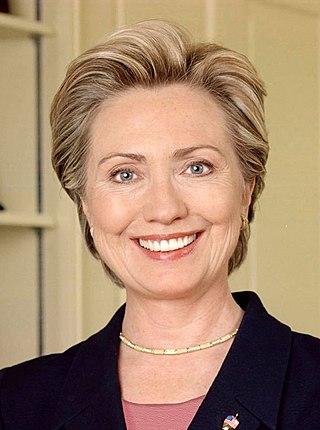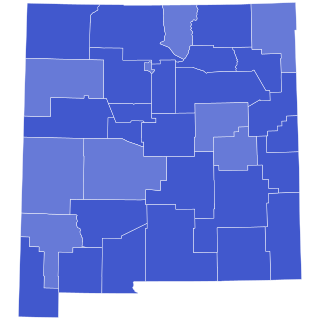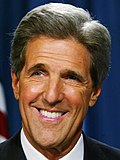
The 2004 United States presidential election in Illinois took place on November 2, 2004, and was part of the 2004 United States presidential election. Voters chose 21 representatives, or electors to the Electoral College, who voted for president and vice president.

The 2008 Iowa Democratic presidential caucus occurred on January 3, and was the state caucuses of the Iowa Democratic Party. It was the first election for the Democrats of the 2008 presidential election. Also referred to as "the First in the Nation Caucus," it was the first election of the primary season on both the Democratic and Republican sides. Of the eight major Democratic presidential candidates, then-U.S. Senator Barack Obama of Illinois received the most votes and was ultimately declared the winner of the Iowa Democratic Caucus of 2008, making him the first African American to win the caucus and the first African American to win a primary state since Jesse Jackson in 1988. Former U.S. Senator John Edwards of North Carolina came in second place and then-U.S. Senator Hillary Clinton of New York finished third, though Clinton received more delegates than Edwards. Campaigning had begun as early as two years before the event.

The 2004 United States presidential election in South Carolina took place on November 2, 2004, as part of the 2004 United States presidential election which took place throughout all 50 states and D.C. Voters chose eight representatives, or electors to the Electoral College, who voted for president and vice president.

The 2008 United States presidential election in Iowa took place on November 4, 2008, as part of the 2008 United States presidential election. Voters chose seven representatives, or electors to the Electoral College, who voted for president and vice president.

The 2008 New Hampshire Democratic presidential primary on January 8, 2008 was the first primary in the United States in 2008. Its purpose was to determine the number of delegates from New Hampshire that would represent a certain candidate at the National Convention. In a primary, members of a political party—in this case, the Democratic Party—will select the candidates to a subsequent election. Since 1920, New Hampshire has always hosted the first primaries in the entire nation. The Democratic Party's primary occurred on the same day as the Republican primary.

The 2008 Oklahoma Democratic presidential primary, part of the process of selecting that party's nominee for President of the United States, took place on February 5, one of the many nominating contests of 2008's "Super Tuesday". The primary election chose 38 pledged delegates to represent Oklahoma at the 2008 Democratic National Convention. The remainder of Oklahoma's 47 delegates consisted of unpledged superdelegates not bound by the results of the primary. The election was a closed primary, meaning that only registered Democrats could vote in this election. Hillary Clinton won the primary by a significant margin.

The 2008 Ohio Democratic presidential primary took place on March 4, 2008 and was open to anyone requesting a Democratic party ballot. In 2008, any registered Ohio voter could on election day request a primary ballot of either the Democratic or Republican party, by signing an affidavit stating that they supported the principles of the party whose ballot they are obtaining.

The 2008 United States presidential election in Nebraska took place on November 4, 2008, as part of the 2008 United States presidential election. Voters chose five electors to the Electoral College, who voted for president and vice president. However, Nebraska is one of the two states of the U.S. that, instead of giving all of its electors to the winner based on its statewide results, allocates just two electoral votes to the winner of the statewide popular vote. The other three electors vote based on their individual congressional district results.

The 2008 United States presidential election in New Hampshire took place on November 4, 2008, as part of the 2008 United States presidential election throughout all 50 states and D.C. Voters chose four representatives, or electors to the Electoral College, who voted for president and vice president.

The 2020 Rhode Island Democratic presidential primary took place on June 2, 2020, after being postponed due to concerns about the coronavirus pandemic, as one of eight delayed and regular primaries on the same day in the Democratic Party primaries for the 2020 presidential election. It was originally planned to take place on April 28, 2020, as one of several northeastern states in the "Acela primary". The Rhode Island primary was a semi-closed primary, with the state awarding 35 delegates, of whom 26 were pledged delegates allocated on the basis of the primary results.

The 2020 Indiana Democratic presidential primary had been scheduled to take place on May 5, 2020, but was postponed to June 2 due to the COVID-19 pandemic, alongside seven delayed and regular primaries on that day in the Democratic Party primaries for the 2020 presidential election. The Indiana primary was an open primary, with the state awarding 89 delegates to the 2020 Democratic National Convention, of whom 82 were pledged delegates allocated on the basis of the primary results.

The 2020 Nebraska Democratic presidential primary took place on May 12, 2020, as part of the Democratic Party primaries for the 2020 presidential election. The Nebraska primary was a semi-closed primary and awarded 33 delegates to the 2020 Democratic National Convention, of which 29 were pledged delegates allocated on the basis of the results of the primary, and was the only contest on that date.

The 2020 Montana Democratic presidential primary took place on June 2, 2020, as one of eight delayed and regular primaries on the same day in the Democratic Party primaries for the 2020 presidential election. The Montana primary was an open primary, with the state awarding 25 delegates to the 2020 Democratic National Convention, of whom 19 were pledged delegates allocated on the basis of the primary results.

The 2020 New Mexico Democratic presidential primary took place on June 2, 2020, as one of eight delayed and regular primaries on the same day in the Democratic Party primaries for the 2020 presidential election. The New Mexico primary was a closed primary, with the state awarding 46 delegates to the 2020 Democratic National Convention, of whom 34 were pledged delegates allocated on the basis of the primary results.
This article contains the results of the 2020 Democratic Party presidential primaries and caucuses, the processes by which the Democratic Party selected delegates to attend the 2020 Democratic National Convention from August 17–20, 2020. The series of primaries, caucuses, and state conventions culminated in the national convention, where the delegates cast their votes to formally select a candidate. A simple majority (1,990) of the total delegate votes (3,979) was required to become the nominee.

The 2004 Vermont Democratic presidential primary took place on March 2, 2004, as part of Super Tuesday along with other primaries and caucuses held throughout the country. Vermont's 15 pledged delegates were allocated based on the results of the primary.

The 2004 Indiana Democratic presidential primary was held on May 4 in the U.S. state of Indiana as one of the Democratic Party's statewide nomination contests ahead of the 2004 presidential election. The winner of the state's primary, Kerry, would go on to be the Democratic Party's nominee for the national election. On Election Day, George W. Bush would defeat Kerry handily in Indiana and would ultimately be re-elected as President.

The 2004 Oregon Democratic presidential primary was held on May 18 in the U.S. state of Oregon as one of the Democratic Party's statewide nomination contests ahead of the 2004 presidential election.

The 2000 Rhode Island Democratic presidential primary took place on March 7, 2000, as one of 15 states and one territory holding primaries on the same day, known as Super Tuesday, in the Democratic Party primaries for the 2000 presidential election. The Rhode Island primary was a semi-closed primary, with the state awarding 33 delegates, of whom 22 were pledged delegates allocated on the basis of the primary results.

The 2000 Ohio Democratic presidential primary took place on March 7, 2000, as one of 15 states and one territory holding primaries on the same day, known as Super Tuesday, in the Democratic Party primaries for the 2000 presidential election. The Ohio primary was a semi-open primary and awarded 169 delegates towards the 2000 Democratic National Convention, of which 146 were pledged delegates allocated based on the results of the primary.




















